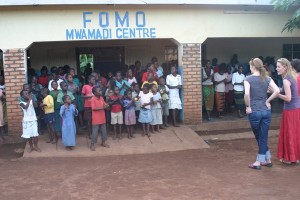
Just before entering a rural orphan daycare project in Mulanje District of Malawi, a welcoming committee greets travelers, after which the children sing and put on little performance
I often wonder if a tourist experience can ever be ‘authentic.’ Do visitors want authenticity? Do they even recognize authenticity when they see it? Whose responsibility is it to prepare them for it? Do people expect rice and beans or fillet steak… or perhaps a nice splattering of both?
As a small travel company, aiming to bridge the fields of tourism and development, The Responsible Safari Company has found that offering the best of the best is perhaps not what travelers want or expect from their visits to Malawi. On a visit to one of our linked community projects, we aim to give visitors the opportunity to integrate, to understand more about the issues facing Malawi, to provide a platform for cultural exchange and to act as a model of ecotourism/geotourism. On paper, this appears to be a winning formula, but in practice there’s an unavoidable clash of expectations.
Before trying to understand and provide travelers with authentic local travel experiences, we have to understand what travelers want to gain from the experience, what their expectations are and if the experience we are offering can really live up to that. I write a lot about responsibility, especially since my company’s name reflects a belief in the ‘responsibility’ the tourism industry holds. Still I find myself struggling: Can I protect the authenticity of the projects I support? Do the projects we support match the expectations of people who are visiting them?
We fortunately rarely get complaints from our clients, but when we do, they usually rings along the lines of ‘Everything was too good, we felt too spoilt: the cold buffet lunch of fillet steak sandwiches was delicious but we would have preferred to sit with a local family and eat their food of rice and beans.’ Or ‘The community project experience was wonderful, but we felt that it was all a bit staged.’
The problem is that the community projects with which we work want to show visitors about Malawian culture and teach them about the work they do, but only after each visitor has received an appropriate welcome. You see, a traditional Malawian welcome of singing and dancing is a must for any visitor who comes from outside the community, not just our clients. An authentic Malawian welcome is done to make visitors feel at home, to bring them into a new community. But many of our guests, particularly the experienced travelers, do not like this part of the visit. I can see that. And yet, if our guides do not call the project shortly before they arrive, the project staff are furious, as they are not ready to receive the guests.

At the end of a day visit to a rural orphan daycare project in Mulanje District of Malawi, travelers dance with the children
I myself feel awkward sitting on the only chairs a project has and watching people dancing, singing and staring intently at me. I too feel like I am watching something staged. But what did I expect instead? To walk into a community, as a stranger, and sit down with a family, eat local food and watch everyday life without anyone wondering why I am there, what I might have brought with me or wanting to welcome me?
Ideally yes, I guess, but isn’t that unrealistic and slightly arrogant?! If I have visitors to my home, I welcome them with my traditions, more likely a cold beer, crisps and guacamole. I would be slightly taken aback if a stranger dropped in unannounced, walked around my house and expected me to be relaxed and continue with my daily chores while they watched me.
When guests come to a Malawian community, should they not leave their expectations and utopian ideas about authenticity at the door? Is it at all possible to do that? Is it necessary or indeed a responsibility for tour companies to prepare guests for what they should ‘expect,’ or is part of the experience the surprise, the lack of expectation? Or, controversially, should the projects try harder to fit into the model of authenticity expected of them by many visitors?
Read more from Kate and some replies she has received to her questions, all on the Local Travel Movement forum thread, Whose View of Authenticity Matters

Interesting discussion…. to see the “real China” for example you should visit a Chinese McDonalds and see whole families enjoying a “night out” but of course that’s not the “real China” a tourist is looking for. Get impression sometimes that “authentic” in the eyes of the tourists means “confirming the often old-fashioned perception of a country” rather then seeing the real country.
Posted by Edwin Briels | October 16, 2010, 4:39 amAuthentic in tourism is just not wrong bey definition. As long as we are tourists, we are visitors, and everyone will show us their best. Thats what we do wen mother in law is coming: we clean up the house. So do people when they tourists, and actually this is what we pay for. Those who ask for an authentic experience actually ask for a) a cultural disneyland experience and b) keeping people poor. I live in southeast asia, so what is authentic here? Rice farming oder playing video games? Hip-Hop or Apsara? Those who ask for authenticity in fact ask for non-development. Please be poor, look poor, do not have electricity, and so on.
We work in tourism, and when people ask me about a authentic experience, I ask back: What would be authentic in your home country? What is authentic french/american/german? Nothing. We are diversified, ear Pizza and listen to gamelan music while wearing T-Shirts made in Cambodia.
Posted by Thomas Wanhoff | October 16, 2010, 5:27 amInteresting questions about a nettlesome problem. It goes to the core of what tourism means today. And, I think, it makes clear the value of Local Travel — travel that accepts a place as it is, as a local lives it.
This whole area of consideration was broached in another article here on the Local Travel Movement at https://www.localtravelmovement.com/328/the-travel-industrys-dilemma/ . There are several meaningful comments there.
So too is all of this addressed in the Local Travel forum’s debate about What Exacty Is Local Travel? For more about that, check out https://www.localtravelmovement.com/forum/general-discussions/what-exactly-is-local-travel/ .
Posted by Ethan Gelber | October 19, 2010, 2:25 amAs the owner of a small travel company with similar aspirations to produce “authentic” travel experiences, I relate very much to this dilemma. I’ve found that more important than the activities our guests do – the monuments and museums, the cultural shows, the historical tours, etc. – are the meaningful relationships they develop along the way. Many of our guests (mostly American students living in Europe) who travel with us to Morocco have never been to an Islamic country, much less spoken with a Muslim on a personal level. I feel very strongly that this is the primary reason why Islamic culture remains shrouded in ignorance to so many Americans. But by facilitating an environment in which our guests can spend time with and engage local Moroccans in meaningful ways – past the superficial small talk typical to prearranged cultural experiences – our guests can ask honest questions about oft-misunderstood elements of Islamic culture with people interested in sharing their life and culture. It takes careful planning and the right people (and no language barriers) to facilitate this kind of experience, but it’s certainly possible. Of course most guests want a mixture of culture, history, sightseeing and luxury, but it’s important to run a travel program with a clear set of goals. For me, that means spreading tolerance and obliterating cultural misconceptions that run rampant between the Western and Arab worlds. To me, this is what travel is about, and people are the best path to true authenticity.
Posted by Peter Stevenson | October 19, 2010, 7:32 pmI think there is a common confusion amongst travellers and many operators – traditional is not the same as authentic. What travellers are often seeking is a sense of the traditional life styles – clothing, architecture, music and dance etc. They claim they want authentic but what they actually mean is traditional.
Just finished a recent survey of tour operators in Luang Prabang in Laos and many local operators were complaining about villages losing their authenticity – specific complaints included the village using electricity, not wearing traditional dress and using concrete in housing construction etc.
Posted by Lee Sheridan | October 27, 2010, 3:55 amHi there
Thanks for above comments. Important debate i feel and the above has helped me to think more about how to prepare visitors and also how to progress in the links we are making with local communities.
Lee- i agree that wording is often where the confusion lies and both words authentic and traditional are often banded around and can be misinterpreted or/and lead to misconceptions and false expectations.
Peter- I feel that our current format of visits perhaps does not allow for discussion enough and will try and work this in as you mentioned as think this is very important.
Thomas and Edwin- your comments struck a cord and made me laugh too! very true indeed…
Once again many thanks and hope the discussion can continue.
Kate
http://www.explore-malawi.com
http://www.responsiblesafaricompany.com
Posted by Kate Ward | October 28, 2010, 12:29 pm